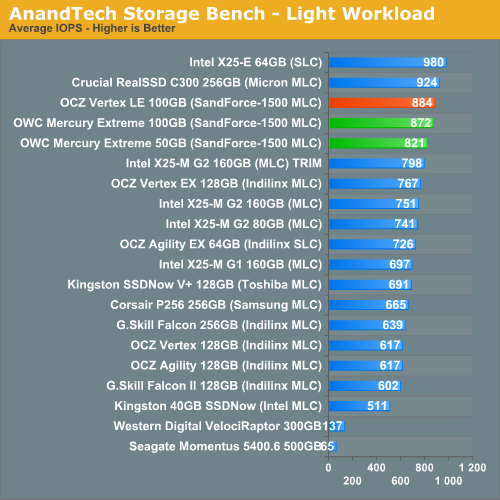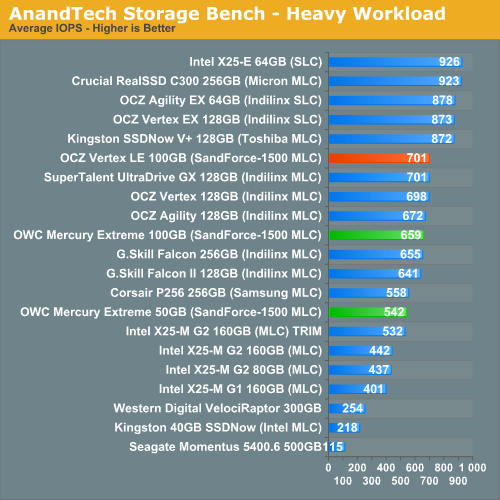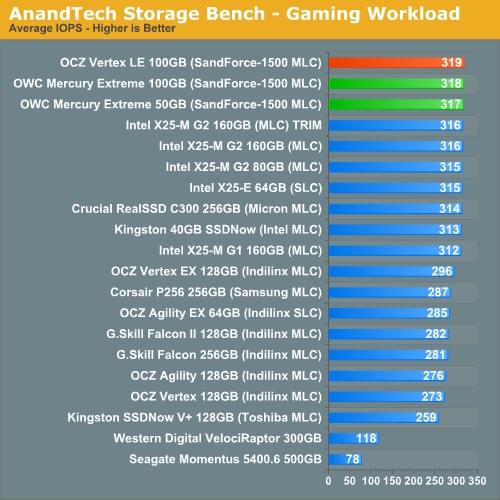OWC Mercury Extreme SSD - First Look at a 50GB SandForce Drive
by Anand Lal Shimpi on February 26, 2010 12:00 AM EST- Posted in
- Storage
AnandTech Storage Bench
Note that our 6Gbps controller driver isn't supported by our custom storage bench here, so the C300 results are only offered in 3Gbps mode.
The first in our benchmark suite is a light usage case. The Windows 7 system is loaded with Firefox, Office 2007 and Adobe Reader among other applications. With Firefox we browse web pages like Facebook, AnandTech, Digg and other sites. Outlook is also running and we use it to check emails, create and send a message with a PDF attachment. Adobe Reader is used to view some PDFs. Excel 2007 is used to create a spreadsheet, graphs and save the document. The same goes for Word 2007. We open and step through a presentation in PowerPoint 2007 received as an email attachment before saving it to the desktop. Finally we watch a bit of a Firefly episode in Windows Media Player 11.
There’s some level of multitasking going on here but it’s not unreasonable by any means. Generally the application tasks proceed linearly, with the exception of things like web browsing which may happen in between one of the other tasks.
The recording is played back on all of our drives here today. Remember that we’re isolating disk performance, all we’re doing is playing back every single disk access that happened in that ~5 minute period of usage. The light workload is composed of 37,501 reads and 20,268 writes. Over 30% of the IOs are 4KB, 11% are 16KB, 22% are 32KB and approximately 13% are 64KB in size. Less than 30% of the operations are absolutely sequential in nature. Average queue depth is 6.09 IOs.
The performance results are reported in average I/O Operations per Second (IOPS):

In our light workload we see a small performance drop from the 100GB to 50GB capacity point. It's nothing tremendous though and definitely not noticeable in real world usage. Other than the usual performance degradation issues you see with running an SSD close to max capacity, you shouldn't really see any difference in performance between a 50GB or a 100GB SandForce drive.
If there’s a light usage case there’s bound to be a heavy one. In this test we have Microsoft Security Essentials running in the background with real time virus scanning enabled. We also perform a quick scan in the middle of the test. Firefox, Outlook, Excel, Word and Powerpoint are all used the same as they were in the light test. We add Photoshop CS4 to the mix, opening a bunch of 12MP images, editing them, then saving them as highly compressed JPGs for web publishing. Windows 7’s picture viewer is used to view a bunch of pictures on the hard drive. We use 7-zip to create and extract .7z archives. Downloading is also prominently featured in our heavy test; we download large files from the Internet during portions of the benchmark, as well as use uTorrent to grab a couple of torrents. Some of the applications in use are installed during the benchmark, Windows updates are also installed. Towards the end of the test we launch World of Warcraft, play for a few minutes, then delete the folder. This test also takes into account all of the disk accesses that happen while the OS is booting.
The benchmark is 22 minutes long and it consists of 128,895 read operations and 72,411 write operations. Roughly 44% of all IOs were sequential. Approximately 30% of all accesses were 4KB in size, 12% were 16KB in size, 14% were 32KB and 20% were 64KB. Average queue depth was 3.59.

Crank up the IOPS and our 50GB drive stops doing so well. I should point out that despite its fall from grace, the 50GB OWC drive is still as fast as the 160GB Intel X25-M G2. While there's indeed a drop in random write speed, it doesn't appear to be a crippling drop.
Our final test focuses on actual gameplay in four 3D games: World of Warcraft, Batman: Arkham Asylum, FarCry 2 and Risen, in that order. The games are launched and played, altogether for a total of just under 30 minutes. The benchmark measures game load time, level load time, disk accesses from save games and normal data streaming during gameplay.
The gaming workload is made up of 75,206 read operations and only 4,592 write operations. Only 20% of the accesses are 4KB in size, nearly 40% are 64KB and 20% are 32KB. A whopping 69% of the IOs are sequential, meaning this is predominantly a sequential read benchmark. The average queue depth is 7.76 IOs.

We've already shown that read speeds are no lower with the 50GB drive, and thus our gaming workload which involves mostly texture/level loads off of the SSD shows no difference between the various capacity points of SandForce drives. We're still very bottlenecked by 3Gbps SATA here.










74 Comments
View All Comments
ayembee - Tuesday, March 9, 2010 - link
...given my 200GB Vertex 2 LE lasted 6 days :however, based on the OCZ support forums it could be the OCZ firmware rather than a specific hardware issue, as it seems they they are getting very similar-sounding bricks on several kinds of vertex models.
Hrel - Sunday, March 7, 2010 - link
Now I only need to wait for SSD's in this price range to drop under $1 per GB; and let me add that after getting used to 12cents per GB I think I'm being extremely generous!OWC Grant - Monday, March 1, 2010 - link
As far as reselling review units, most manufacturers DO sell their review units and other products clearly marked as "open box", B stock, or refurbished and thus provide users with another purchase option. We offer these types of products in our monthly "clearance/garage sale" promo and are very well liked by our newsletter readers as great "insider" deals.Our statement of all the drive sizes (50/100/200GB) offering the same performance in terms of raw sustained data transfer rates was and is still true. As noted in Anand's final summary and direct communication with us, the overall performance of the 50GB model "looks quite good" and "performance is nearly identical in call cases except one." (a small random write file) We are looking into that one instance and will advise on any outcome.
Thanks as always to Anand and you readers for your interest in SSD's in general and our offerings in that category.
jed22281 - Friday, March 26, 2010 - link
"As noted in Anand's final summary and direct communication with us, the overall performance of the 50GB model "looks quite good" and "performance is nearly identical in call cases except one." (a small random write file) We are looking into that one instance and will advise on any outcome."So what was the outcome?
Thank-you.
skimike - Monday, May 3, 2010 - link
Out of curiosity, do you know if OWC has a secure/sanity erase utility for the OWC Mercury Extreme 100GB drive? I called OWC's tech support line and they didn't know anything about it. And the drive password used by hdparm in Linux isn't set to NULL so I can't use hdparm, either.monomer - Monday, March 1, 2010 - link
Dailytech posted an article on Friday saying that JMicron will be releasing a new controller with a 128MB DRAM cache soon. Does anyone know if they actually fixed their random access problems, or did they just throw more cache at it to try to cover it up?tuskers - Monday, March 1, 2010 - link
Something I'd love to see is how much software compile times improve with an SSD. As a professional software engineer, I'd love to see whether SSDs would improve a common real-world task like this.hyc - Monday, March 1, 2010 - link
Yes, noticeably.I write code all day. All of my machines now have SSDs as their primary drive. 256GB G.Skill Titan in my desktop, 256GB Samsung in my current laptop, 128GB Transcend PATA in my old laptop, 120GB OCZ CoreV2 floating on an eSata adapter for quick bulk copies.
arklab - Monday, March 1, 2010 - link
Pardon my ignorance, but I'm new to SSD's.I (think) I read in your first review that only Sand Force is able to make utilities for these (OWC and OCZ LE) drives.
Does this include the trim command (for Windows 7 use), or can we just use some "generic" command?
What would OSX users do?
Thanks!
fictionfree - Monday, March 1, 2010 - link
I've purchased a couple items from OWC in the past - can't say I'm a fan of the company. It wouldn't surprise me if they resold review drives. I purchased an external Firewire drive from them a few years ago, and when the internal drive died, I took the case apart to see that it was a refurbished drive. I didn't buy a refurb drive, I bought a brand new drive - but they filled the case with a refurb. Not cool - and they refused to do anything to make it right.Just my 2 cents, but I find them to be shady.